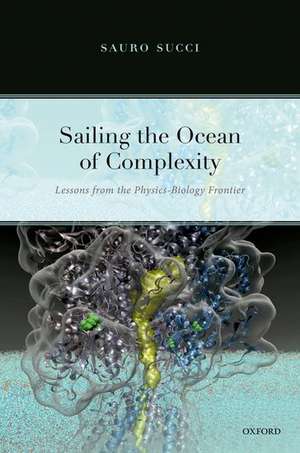Sailing the Ocean of Complexity: Lessons from the Physics-Biology Frontier
Autor Sauro Succien Limba Engleză Hardback – iun 2022
Preț: 205.07 lei
Preț vechi: 231.46 lei
-11% Nou
Puncte Express: 308
Preț estimativ în valută:
39.24€ • 42.61$ • 32.97£
39.24€ • 42.61$ • 32.97£
Carte disponibilă
Livrare economică 21-27 martie
Livrare express 15-21 martie pentru 70.01 lei
Preluare comenzi: 021 569.72.76
Specificații
ISBN-13: 9780192897893
ISBN-10: 0192897896
Pagini: 390
Ilustrații: 186 line drawings and colour halftones
Dimensiuni: 162 x 240 x 26 mm
Greutate: 0.88 kg
Ediția:1
Editura: OUP OXFORD
Colecția OUP Oxford
Locul publicării:Oxford, United Kingdom
ISBN-10: 0192897896
Pagini: 390
Ilustrații: 186 line drawings and colour halftones
Dimensiuni: 162 x 240 x 26 mm
Greutate: 0.88 kg
Ediția:1
Editura: OUP OXFORD
Colecția OUP Oxford
Locul publicării:Oxford, United Kingdom
Recenzii
This book gives a nontechnical survey of complex systems, strongly emphasizing the connection of fundamental physics to biology. Starting with a very nice foundational discussion, the Succi goes on to look at the connection developed by Boltzmann between microscopic physics and macroscopic biology...the thoughtful reader will be rewarded.
This is an interesting exploration of how the complex macroscopic world is derivable from microscopic physics, and how the non-linearity of complex systems leads to issues of predictability and at the same time accounts for physical structures. The author gives personal comments on his own appreciation of the physics throughout the book, as well as a thought-provoking conclusion suggesting that our experience of time is a consequence of the emergence of complexity.
Complexity is between the two infinities "very big" and "very small" - always a fascinating subject. The author explains things in a very easy-going way, and adds some entertaining stories and thoughts which make it entertaining to read.
Complexity science is of critical importance in the modern world, but not on the radar screen of the average reader. This book, designed for the general public, is intended to fix that problem in a very enjoyable and entertaining style.
A fresh and competent view on a very interesting scientific topic.
Sauro Succi's new book is both superb and essential. Succi, with clarity and wit, takes us from quarks and Boltzmann to soft matter - precisely the frontier of physics and life. Someone said, “There is no truth beyond magic”. Succi shows us the magic at the edge of life.
This is an interesting exploration of how the complex macroscopic world is derivable from microscopic physics, and how the non-linearity of complex systems leads to issues of predictability and at the same time accounts for physical structures. The author gives personal comments on his own appreciation of the physics throughout the book, as well as a thought-provoking conclusion suggesting that our experience of time is a consequence of the emergence of complexity.
Complexity is between the two infinities "very big" and "very small" - always a fascinating subject. The author explains things in a very easy-going way, and adds some entertaining stories and thoughts which make it entertaining to read.
Complexity science is of critical importance in the modern world, but not on the radar screen of the average reader. This book, designed for the general public, is intended to fix that problem in a very enjoyable and entertaining style.
A fresh and competent view on a very interesting scientific topic.
Sauro Succi's new book is both superb and essential. Succi, with clarity and wit, takes us from quarks and Boltzmann to soft matter - precisely the frontier of physics and life. Someone said, “There is no truth beyond magic”. Succi shows us the magic at the edge of life.
Notă biografică
Sauro Succi graduated in Nuclear Engineering from the University of Bologna and holds a PhD in Physics from the Swiss Polytechnique Institute in Lausanne. He has been working at several Italian and European institutions, including the Max Planck Institute for Plasma Physics, EPFL, IBM Europe, The Italian National Research Council and lately the Italian Institute of Technology. He also held numerous teaching and research appointments in Europe and USA, particularly at Harvard University.
